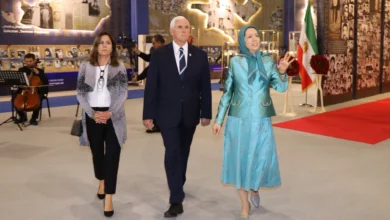The Wafd party, Egypt’s largest official opposition party, announced on Friday their rejection to boycotting the upcoming parliamentary elections.
Despite a strong split in the party's general assembly, the decision was made based on a 52 percent vote in favor of participation in the elections.
The call for the elections boycott has been put forward by the National Association for Change which was formed following the return of former UN nuclear agency head Mohamed ElBaradei, who has been leading a nascent movement for political reform. But opposition parties' decision to actively participate in the elections is putting an end to this call.
The Muslim Brotherhood, the country's largest opposition bloc that is banned from forming an official party, said on Thursday that while it is yet undecided with regards to participation in the elections, ElBaradei's call for boycott is not obligatory.
The Wafd's assembly members who are for the participation in the elections said that the boycott would cause the party to lose potential supporters to other political groups. “The Wafd has a bad experience with boycotting before. When we boycotted the elections back in 1990, we never won the number of seats that we used to have before that,” said Essam Shiha, an assembly member, and a member of the parliament who is also running in the next election.
Shiha referred to the number of seats that the Wafd party won in the elections of 1984 and 1987, which were 38 and 54 respectively, compared to a range of six to seven seats in the last three rounds of elections. “When we boycotted, we lost our share to the Muslim Brotherhood back in the 1990s and we don’t want to make this mistake again,” added Shiha.
Although boycotting seemed, to some, like the best option in lieu of risking rigged elections, it also would mean sacrificing Wafd’s presence on the political scene. “It was a very hard decision,” said Mounir Fakhry Abdelnour, the party’s general secretary. Abdelnour said that recent weak presence of opposition parties in the parliament compared to the 1980s is due to the interference by the security forces in the election process, which has led to increased rigging. He added that opposition parties have become discouraged compared to the 1980s when they were still newly re-established after they had been abolished during former President Gamal Abdel Nasser’s era, when a one-party-state was enforced.
Analysts say that participating in the election is better for the opposition than boycotting. “Participating in the elections allows opposition parties to actively counter the National Democratic Party (NDP),” said Amr Abdel Rahman, a political analyst and a writer in al-Bosla, a political journal.
Despite suspected rigging and violent threats, opposition parties, such as Wafd, are expected to get a higher number of seats in this year’s elections, said Abdel Rahman. “It is obvious from the freedom that Wafd has been given in the past year to carry on its activities, that it will be granted a higher percentage in the parliament this year.”




